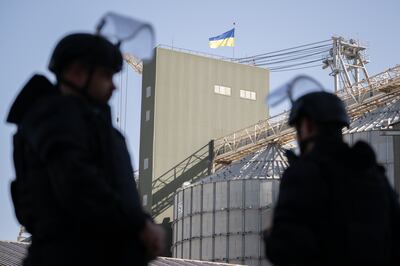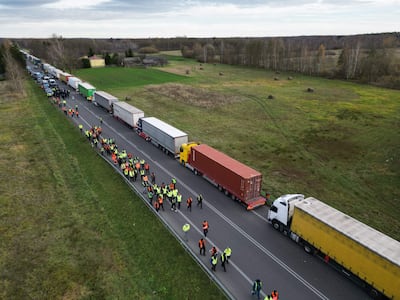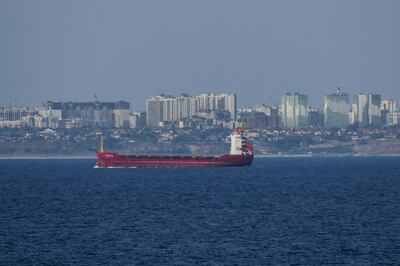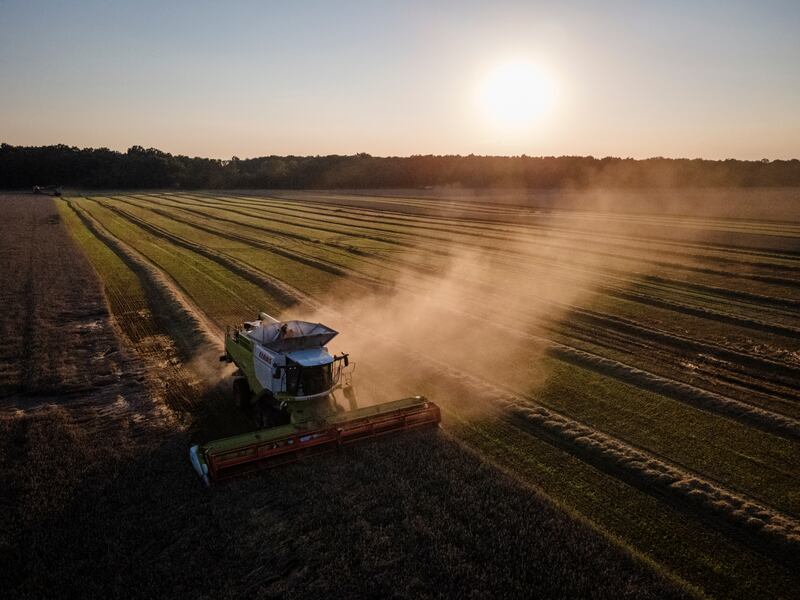Ukraine is enjoying a rebound in Black Sea exports that could point the way out of a grain-related rift with neighbours such as Poland.
After Russia scuppered a UN deal ensuring safe passage out of Ukraine's ports, at least 200 ships have sailed an alternative corridor that hugs the Black Sea's western shores.
The lane's success is attributed to Ukrainian naval gains and falling insurance costs that have lured back ship owners. The volume of rail freight destined for Ukraine's seaports climbed by 70 per cent from October to November, according to official figures.
It may also reduce pressure on less-than ideal land routes via countries such as Poland and Romania, where a glut of cheap Ukrainian grain has angered local farmers.
Poland has a new leadership that wants to rally western powers "loudly and decisively" behind Ukraine, after relations with the previous nationalist government in Warsaw turned sour. New Prime Minister Donald Tusk also wants to repair ties with the EU after the previous regime flouted the bloc’s rules, for example with a go-it-alone ban on Ukrainian grain imports.
Despite this, the Tusk government has already made clear it will not allow a “complete and quick opening of the market” to Ukrainian grain, which it says would fatally undercut Polish farmers.
However, the market is shifting back to the Black Sea and "if that stays stable, then the issue with Poland and Romania – especially with Poland – will become less and less relevant," said Bilal Muftuoglu, a grain and shipping analyst for shipbroker Howe Robinson.

Some Ukrainian grain has been routed by land since Russia invaded its neighbour in February last year and blockaded its Black Sea ports, throttling trade and damaging Ukraine’s wartime economy.
The knock-on effects are potentially severe for buyers such as Lebanon, Sudan and Yemen, which rely on agricultural imports from Ukraine, one of the world’s most fertile countries.
Still, Mr Tusk says he can support Ukraine while also showing a “warm and friendly assertiveness” on Polish interests – “it is not that difficult”, he told MPs in an inaugural speech.
Polish politics
Mr Tusk has reasons to be cautious with the grain ban.
The first is about Polish politics.
Polish farmers remain on edge after prices slumped until the import ban, and Poland’s new Agriculture Minister Czeslaw Siekierski is from a rural party that Mr Tusk must keep onside to maintain a stable coalition.
Although, in theory, grain can now pass only through Poland – say to its Baltic Sea ports or to Rotterdam in western Europe – carried by registered transit companies, there are reports of slippage into the Polish market.

Romania, which also handles Ukrainian grain, has managed to protect its local market with strict rules and because the journey is fairly short by river, Mr Muftuoglu told The National.
By contrast, goods crossing through Poland by road or rail “have to transit the entire country to go up to the northern ports of Gdynia and Gdansk”, he told The National.
The grain ban – over which Ukraine has complained at the World Trade Organisation – is playing out in parallel to a blockade by Polish lorry drivers who also feel undercut by Ukrainians. Farmers have joined their picket.
Ukraine is officially briefing that people should not expect “quick solutions” to the dispute, while hoping Polish ministers will be more pragmatic than their election rhetoric suggests.
Mr Tusk himself attacked the previous government for letting goods flood the market – while saying there was “no point blaming Ukrainians” – and has promised that farmers will “see what a tough, competent and determined fight for their interests really means”.
Shift to the Black Sea
The second reason for Poland to play for time is that things have been looking up for exports from Ukraine.
Britain’s Foreign Secretary David Cameron told parliamentarians the new corridor owed its success to Ukrainian military gains that took out a “significant proportion” of Russia’s Black Sea fleet.
Black Sea Grain Initiative - in figures
“While there is something of a stalemate on land, there certainly isn’t a stalemate on the Black Sea,” said Mr Cameron, who visited the Ukrainian port of Odesa on his first foreign trip in office.
“It’s not the grain initiative, it’s not some UN thing, it is a force of arms that’s brought this back. And that means that Ukraine is exporting again, the economy’s growing again.”

With dozens of merchant ships using the new corridor, Mr Muftuoglu said the costs of war-risk insurance were falling, making the Black Sea route more viable as a way of reaching, for instance, Egypt and China.
With Ukraine also working on a tracking system for exports, Mr Tusk can hope that – if he gives it long enough – the issue of grain transit through Poland will slip away quietly.
“Over the past two, three months, there’s been an increasing shift towards the Black Sea ports. We see more and more ship owners willing to also call at the Ukrainian ports,” Mr Muftuoglu said.
“The initial issue was that only small ship owners took the risk because they thought they would get good premiums, so they made that move. But then gradually more mainstream ship owners have also made that transition."







